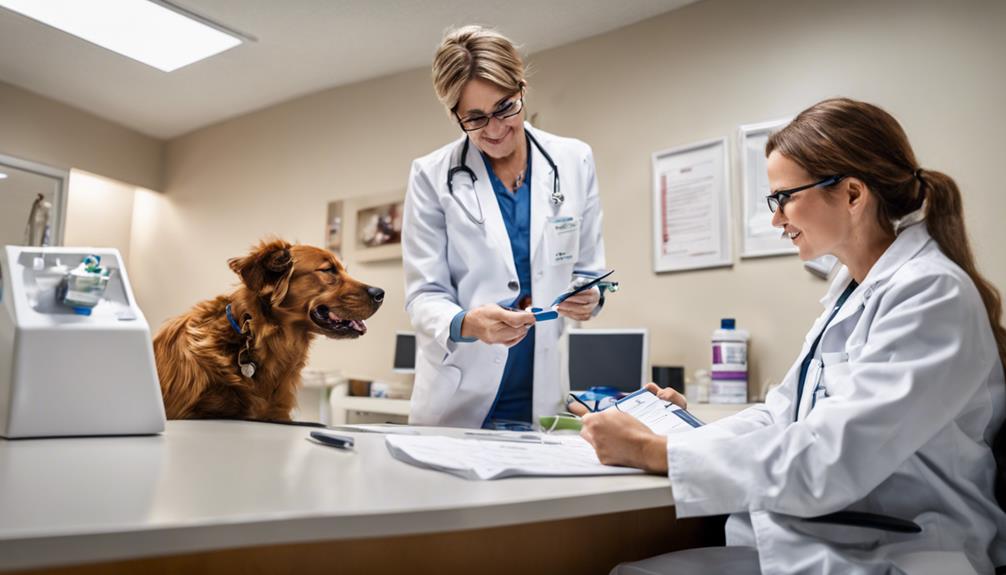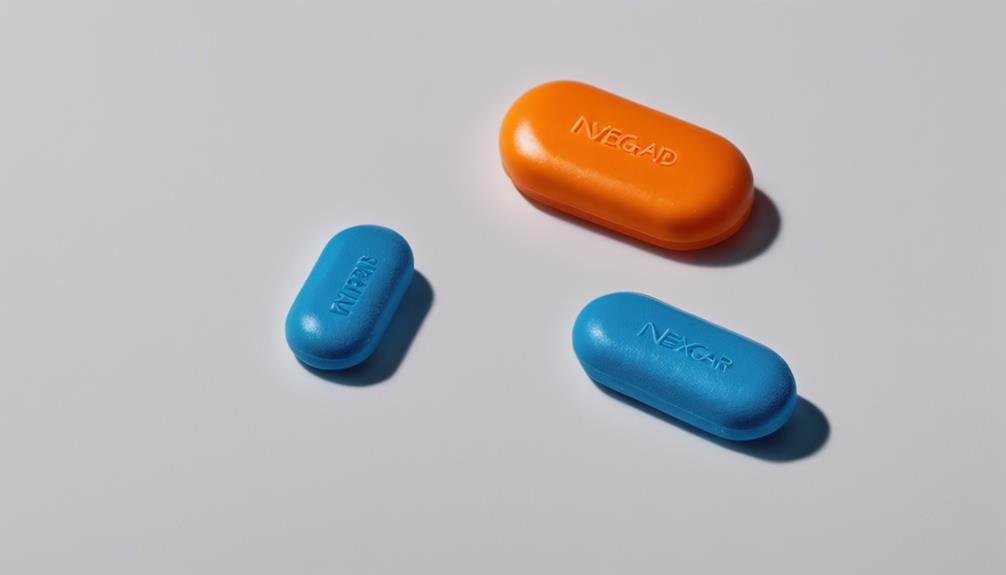How to Get Prescription for Nexgard
To get a Nexgard prescription, schedule a vet appointment. Discuss your dog's health and ask about Nexgard. Follow vet's instructions on obtaining and using the prescription. Watch for any reactions in your dog. Remember, taking care of your pet's health is crucial.
Key Takeaways
- Schedule a vet appointment and discuss NexGard.
- Provide your dog's health history and ask for a prescription.
- Follow dosage instructions carefully based on your dog's weight.
- Obtain the prescription from a pharmacy or vet's office.
- Administer NexGard orally as instructed by your veterinarian.
Benefits of NexGard for Dogs
If your furry companion frequently encounters ticks and fleas, NexGard provides effective protection against these pests. This chewable tablet is a convenient way to safeguard your dog from the discomfort and health risks associated with these parasites. NexGard works by killing fleas before they can lay eggs, breaking the flea life cycle and preventing infestations in your home. It also kills black-legged ticks, American dog ticks, Lone Star ticks, and brown dog ticks before they can transmit harmful diseases to your pet.
One of the key benefits of NexGard is its fast-acting formula, with many dogs experiencing relief from fleas within hours of administration. Additionally, the tasty beef-flavored chew makes it easy to administer, eliminating the struggle of giving your dog a traditional pill. With NexGard, you can enjoy peace of mind knowing that your furry friend is protected from these common pests. Make sure to consult your veterinarian to determine the right NexGard product and dosage for your dog based on their weight and health status.
Finding a Veterinarian
To ensure your dog receives the best care and advice regarding NexGard and other health needs, finding a reputable veterinarian is vital. Start by asking friends, family, or fellow pet owners for recommendations. Look for a veterinarian who's knowledgeable, experienced, and has a good rapport with both you and your furry friend. Check online reviews and ratings to get an idea of other pet owners' experiences with different veterinarians in your area.
When researching potential veterinarians, consider their location and office hours. You want a clinic that's convenient for regular check-ups and emergencies. It's also essential to inquire about the services they offer, such as vaccinations, wellness exams, and the ability to prescribe NexGard or other medications.
Once you've narrowed down your options, give the clinics a call to ask any additional questions you may have. A good veterinarian will be happy to address your concerns and provide reassurance about the care they can offer your beloved pet.
Schedule a Vet Appointment
Consider reaching out to your chosen veterinarian's clinic to schedule an appointment for your dog's health needs. When contacting the clinic, be prepared to provide details such as your dog's breed, age, any existing health conditions, and the reason for the visit. It's important to schedule the appointment well in advance to ensure you secure a convenient time slot that fits your schedule.
When setting up the appointment, inquire about any specific instructions or requirements the veterinarian may have. This could include fasting your dog before the visit or bringing along any relevant medical records. Additionally, confirm the cost of the appointment and whether there are any forms or documents you need to fill out beforehand.
Remember to jot down the date and time of the appointment in your calendar and set a reminder so you don't forget. Being proactive and organized when scheduling the vet appointment will help streamline the process and ensure that your dog receives the necessary care in a timely manner.
Discussing Nexgard With Your Vet
When discussing Nexgard with your vet, ensure you provide relevant information about your dog's health history and any current medications they're taking. This will help your vet make an informed decision about whether Nexgard is the right flea and tick treatment for your furry friend.
Be prepared to discuss any existing health conditions your dog may have, such as allergies or sensitivities, as this can impact the suitability of Nexgard. Additionally, inform your vet about any other medications or supplements your dog is currently on, as certain combinations can have adverse effects.
During the conversation with your vet, don't hesitate to ask any questions or express any concerns you may have about Nexgard. Your vet is there to address your inquiries and provide guidance on how to safely administer the medication.
Obtaining and Using the Prescription
You can obtain the prescription for Nexgard from your veterinarian after discussing its suitability for your dog's flea and tick treatment. Once your vet determines that Nexgard is the right choice for your furry friend, they'll write a prescription for the medication. Make sure to follow the dosage instructions carefully to ensure the effectiveness of Nexgard in protecting your dog from fleas and ticks.
To use the prescription, take it to a pharmacy or order directly from your veterinarian's office. Ensure you get the correct dosage based on your dog's weight to prevent any adverse effects. Administer Nexgard to your dog as instructed by your vet. It's typically given orally and comes in a chewable form that most dogs find palatable.
Remember to monitor your dog for any unusual reactions after giving them Nexgard. If you notice any unexpected symptoms or side effects, contact your veterinarian immediately. By obtaining and using the prescription correctly, you can help keep your dog protected from pesky fleas and ticks.
Frequently Asked Questions
Are There Any Potential Side Effects or Risks Associated With Using Nexgard for Dogs?
When using NexGard for dogs, potential side effects and risks may include vomiting, diarrhea, or lethargy. It's essential to monitor your pup closely and consult your vet if you notice any concerning symptoms.
Can Nexgard Be Used for Puppies or Senior Dogs, or Is It Only Suitable for Adult Dogs?
Nexgard can be used for puppies, adult dogs, and senior dogs, offering protection against fleas and ticks. It's suitable for dogs of various ages, but always consult your vet for the right dosage and frequency.
How Often Should Nexgard Be Administered to My Dog for Effective Flea and Tick Prevention?
Administer Nexgard to your dog once a month for effective flea and tick prevention. Remember to give it with food. Consistent use is key in protecting your furry friend from these pesky parasites year-round.
Are There Any Alternative Options to Nexgard That I Should Consider for My Dog's Flea and Tick Prevention?
Consider other flea and tick preventatives for your dog like Bravecto, Simparica, or Frontline. Consult your vet for the best option based on your dog's needs. Each product has its unique benefits.
Can Nexgard Be Used in Conjunction With Other Medications or Supplements My Dog Is Currently Taking?
Yes, NexGard can generally be used alongside other medications or supplements your dog is taking, but it's important to consult your vet first to ensure there are no potential interactions or issues.
Conclusion
Now that you have learned about the benefits of NexGard for dogs and how to obtain a prescription, you're ready to take the next step in protecting your furry friend from fleas and ticks.
Remember to find a veterinarian, schedule an appointment, discuss NexGard with your vet, and obtain the prescription to start using this effective treatment.
Your dog's health and well-being are worth the effort!








